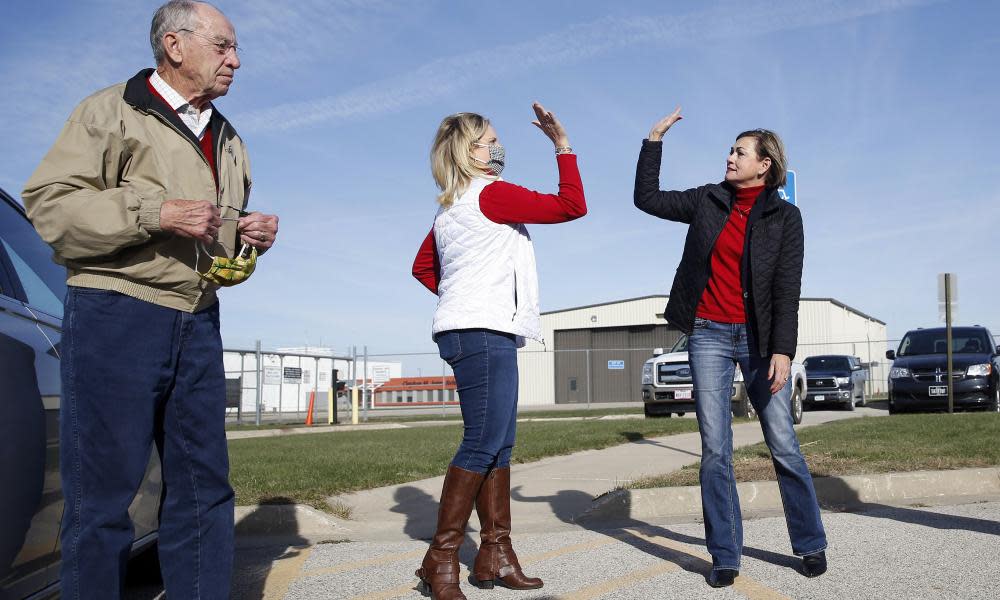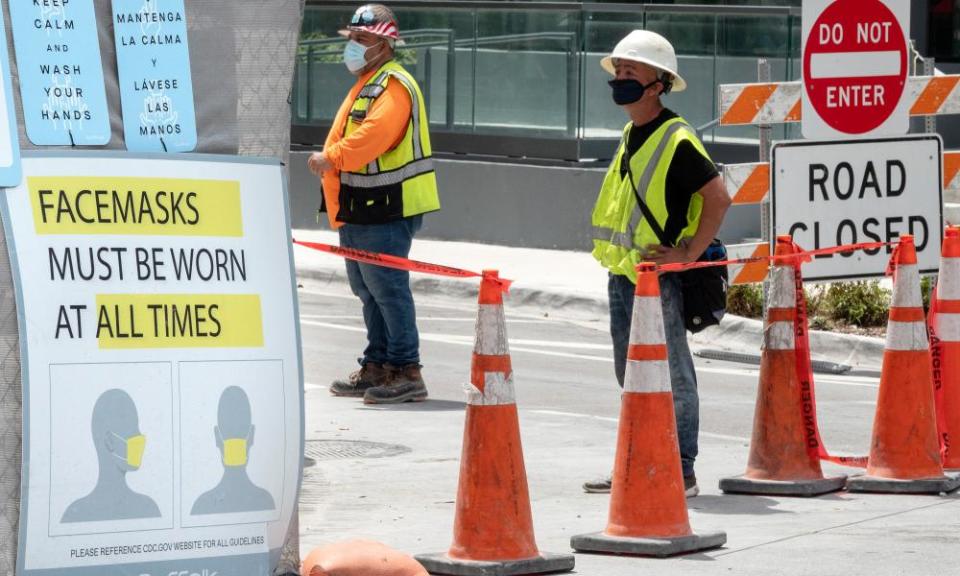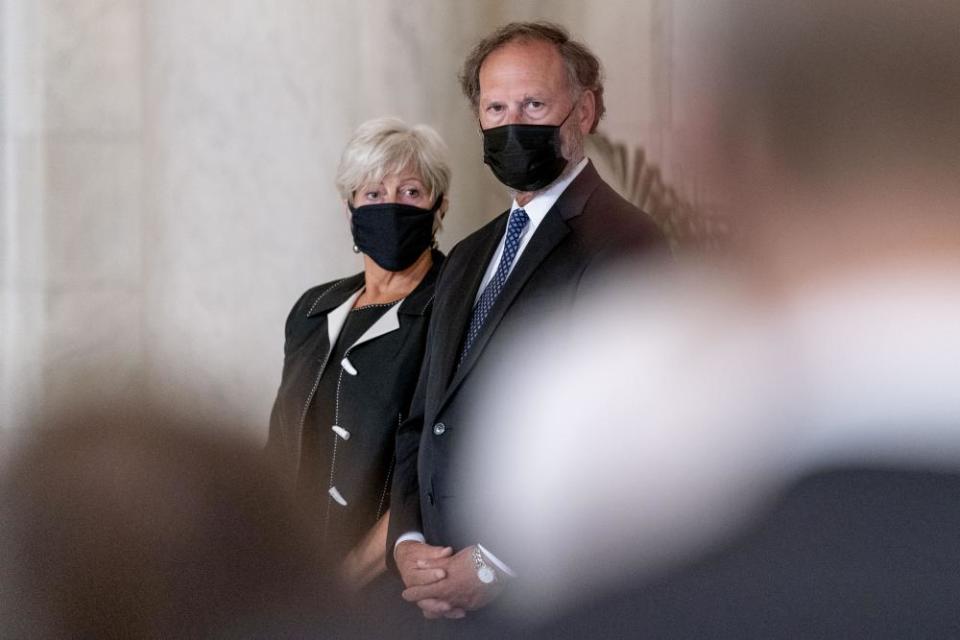Republican officials finally forced into action on Covid-19 as reality bites

After Republicans won big on election night in the state of Iowa, in America’s heartland, Governor Kim Reynolds claimed vindication for her light-handed approach to the coronavirus pandemic.
“It was a validation of our balanced response to Covid-19,” Reynolds said of the vote. “One that is mindful of both public health and economic health.”
Related: Republican senator Chuck Grassley tests positive for coronavirus
That was two weeks ago. Since then, the trajectory of the pandemic in Iowa, as elsewhere in the American midwest, has taken a sharp and tragic turn.
Daily confirmed cases of Covid-19 and hospitalizations are up 100% in Iowa since election night, and daily deaths are up more than 50%, hitting 41 on Tuesday. Nationwide, the United States has passed 250,000 confirmed deaths – about twice as many as any other country.
Like other Republicans torn between fighting the pandemic and fighting the culture wars, Reynolds spent months dismissing the need for a mask mandate in her state, calling it a “feelgood” measure. But new warnings from local hospitals of a dangerous overload finally drove Reynolds to reverse course this week.
“The pandemic in Iowa is the worst it has ever been,” she said. “No one wants to do this. I don’t want to do this.”
The reluctance to “do this” is not exclusive to Reynolds – but it is exclusive to one of America’s two major political parties.
Since the start of the pandemic, Republican officials across the country, cowed by Donald Trump, conspiracy-swayed constituents and lesser political calculations, have resisted asking voters to take personal action to stop the spread of Covid-19. Until recently, many of those states had escaped the worst consequences of the official dereliction, enjoying some luck in the mysterious dynamics of the virus’s spread.
But with the arrival of cooler temperatures, an increase in indoor activity and widespread pandemic fatigue, that story has changed terribly this fall, as public health experts predicted it would. With each passing week, the unwillingness of elected Republicans to act against the virus is taking an increasing toll, health experts say.
And the mistrust in basic public health guidelines that Republicans have sown has a further, potentially destructive cost yet to be paid: the climate of mistrust seems likely to hamper the country’s imminent effort to escape the virus’s clutches through universal vaccination.
“It’s not just that the anti-mask, anti-distancing, anti-testing Republicans are wrong as a matter of public policy,” tweeted Bill Kristol, editor of the conservative anti-Trump Bulwark. “It’s not even that they lack empathy for those who suffer. They relish their lack of empathy. They glory in their callousness. They are proud of their inhumanity.”

Daily coronavirus-related deaths since the election are up by more than 50% in western states with Republican leadership including North Dakota, South Dakota, Wyoming and Nebraska, according to the Covid Tracking Project – and like Iowa, those states have been flooded with new infections.
Some Republican governors, such as Reynolds and the North Dakota governor, Doug Burgum, have been driven by desperation to reverse themselves on masks. But others, such as Nebraska’s governor, Pete Ricketts, a major Trump backer, have resisted a general mask mandate.
In lieu of such a mandate, hundreds of Nebraska healthcare workers signed an open letter published on Wednesday by the Omaha World-Herald, pleading with the public to mask up.
“Your frontline health care workers are exhausted,” they wrote. “We are scared that the hospitals won’t have the space and people to meet the ever-growing demand. We are seeing many deaths and will continue to see many more.”
There is no clear map of the United States overlaying holes in political leadership with spikes in coronavirus cases, because the virus does not respect political boundaries, said Lawrence O Gostin, founding O’Neill Chair in global health law at Georgetown University and a professor of public health at Johns Hopkins University.
Related: US engulfed in crisis as Covid death toll hits 250,000 – but there are signs of hope
“It’s really hard to make a direct and causal connection between governors in conservative states that refuse to order masks, distancing, or send out mixed messages” – and cases, Gostin told the Guardian.
“But make no mistake about it, those are causing enormous flare-ups in the United States, because we can’t think of the state as some self-contained unit. They affect other states and they affect the entire country.”
Republican resistance to masks, social distancing and other coronavirus mitigation measures began early on in the pandemic. The purely political prism through which Trump saw the pandemic set the tone.
In private, Trump said the virus was “deadly stuff” that “goes through the air” – while in public he said the virus was a “hoax” that would “disappear”. Any Republican governor who dared split with the party line, such as Ohio’s Mike DeWine and Maryland’s Larry Hogan, drew wrathful Twitter fire from the White House.
Republicans also took up coronavirus rejectionism as an ideological battle, equating basic health precautions with existential threats to personal freedom.
The conservative supreme court justice Samuel Alito said last week that safety measures had exacted “previously unimaginable restrictions on individual liberty”. The attorney general, William Barr, called prospective stay-at-home orders “the greatest intrusion on civil liberties in American history” apart from slavery.

The partisan chasm produced a striking scene on the Senate floor this week, when the Ohio Democrat Sherrod Brown asked the presiding senator, the Alaska Republican Dan Sullivan, to wear a mask to protect the health of staff members required to be present in the chamber – including one staffer seated directly underneath Sullivan.
“I don’t need your instruction,” Sullivan barked in refusal.
Ted Cruz, another Republican senator, piled on. “Sherrod Brown is being a complete ass,” he tweeted.
The senators had been called to the chamber to confirm a final few Trump judges. But that fact only underscored the Republican failure, in the eyes of critics, to meet Democrats halfway on a new and direly needed coronavirus relief bill, which appears a dead letter.
Related: More than 250,000 Americans have died from Covid-19. The tragic story in numbers
For millions of American lives touched by the coronavirus, it was too late to correct the failure to stand up protocols for masking and social distancing, testing and contact-tracing. But negative consequences of the culture war around the pandemic could still lie ahead, damaging the national vaccination effort.
“The primary responsibility for prioritizing vaccines and distributing them [lies with] state and local health departments,” said Gostin. “Even though you’re going to probably have leadership that values science, you’re nonetheless going to have state and local government that are resistant, and are not effectively distributing the vaccine and not encouraging their citizenry to get the vaccine.
“And so the splintered, fragmented approach in the United States will only look worse when it comes to a vaccine distribution.”
Gostin said he hoped that Biden would convene a Covid-19 summit at the White House including all the governors and public health commissioners.
“It’s going to be hard,” said Gostin, “but I think that’s our only hope to meet what we face: the most daunting logistical challenge for a vaccine campaign in our lifetime.”

